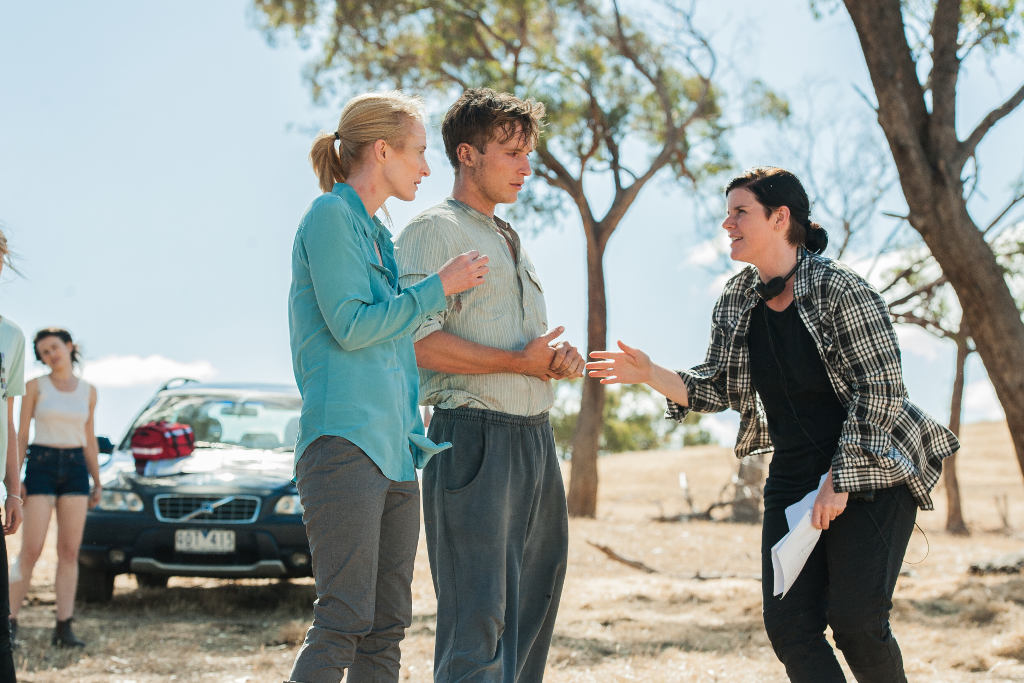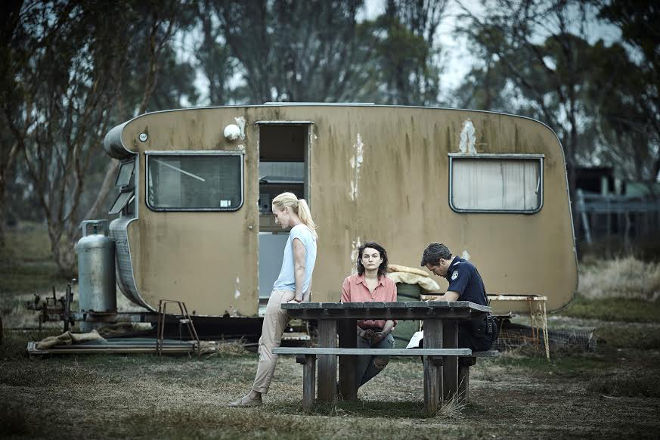‘Glitch’ Director Emma Freeman On The Strengths And Limits Of Australian TV
"We’re trying to compete with international projects -- but the reality is we don’t have the time and the money to do that."

The ABC has a proud history of fostering quality TV drama, and Glitch — which finishes up on the ABC at 8.30pm tonight — continues the tradition. The six-part series presents the familiar character of an Australian cop (a beautifully conflicted Patrick Brammall) in a country town, given a supernatural twist: think Blue Heelers with zombies, in the eerie, dreamy style of Peter Weir.
Written by Tony Ayres and Louise Fox, who co-wrote the Australian miniseries The Slap, the pedigree behind the show’s script is one of its key strengths: rather than focusing on the plot’s supernatural set-up — six people from different times, returning from the dead — it uses that as a jumping off point to explore how emotions and relationships are affected by the experience.
The other major strength of the show lies in its skilful, nuanced rendering by series director Emma Freeman. Freeman has an impressive array of directing work on her reel, from powerful, complex dramas like Love My Way, Miss Fishers Murder Mysteries, the multi-award winning telemovie Hawke, and Puberty Blues, to haunting, decadent work on video clips for Cocorosie; 2013’s ‘Child Bride‘ won Best Music Video at St Kilda Film Festival.
Freeman is one of the many unsung and unseen creators who are lifting the reputation of Australian television from soapie content like Neighbours and Home and Away, to more ambitious series that can compete with the overseas offerings of TV’s new golden age. While the actors in front of the cameras are the stars, it’s people like Emma who build the universes for them to shine in. And it’s all the more impressive in such a male-dominated industry.
Glitch is her first program as series director (most TV shows have a range of guest directors over the course of each season), and the show is stronger for it. Her involvement in the project began at the script stage, but that was only the beginning of what attracted her to this series.
Embracing Australianism. And Zombies.
“We’ve spent so many years trying to match American work, or trying to match British work,” she says. “On Glitch, it was really refreshing to be able to embrace the Australianism of the project, and be inspired by [Australian] films like Picnic At Hanging Rock. I’ve watched that film so many times and it’s so extraordinary, [especially its] atmosphere and performance: it’s a truly eerie film, and completely naturalistic.”
With Australia’s history of long-running series based in country towns (A Country Practice, Blue Heelers, and McLeod’s Daughters, to name a few), there’s a familiarity to the setting which gives Glitch a very definite mise en place before the first episode even begins. Set in the picturesque Victorian town of Castlemaine, the show draws on the viewers’ expectations before turning them on their heads, as six people reach up through their graves to return from the dead. It’s ostensibly a zombie show, but it feels completely naturalistic.
“What really struck me when I finished reading the script was, ‘What if this happened to me? If I was just in my home and I heard a knock at the door and opened it, and it was my grandmother that’s been dead for five years – what would I do?’ That was a real leveler for me — all of us heading into the project were coming to it from that place of truth, you know? That this extraordinary thing could happen to really ordinary people.” It is a credit to Freeman that with such an otherworldly set-up, the show is able to feel so solidly like other ‘straighter’ relationship dramas like Love My Way and Puberty Blues.

The Power Of Limitation In Australian TV
Of course, it’s not always an easy industry to navigate. “Television in Australia is very challenging. We’re on very tight schedules, we’re trying to compete with international projects — but the reality is we don’t have the time and the money to do that,” Freeman says. “So it’s a really challenging task for not only me as the director, but also for the cast who have to create their performances under pretty tense conditions.”
The tension manifests in the day-to-day operation of a show like Glitch, forcing the cast and crew to walk onto set rehearsed and with a clear vision of what they want to get out of it. “It definitely [involves] less shots or less takes, and as a production there’s less money for the art department. But sometimes the rough edges are what makes a project really beautiful.”
Directing all six episodes of the series brought a different challenge for her — and a more rounded aesthetic and atmosphere to the series. “It’s really different [being the sole director],” she says. “In an eight or nine week schedule you’re basically shooting three feature films. Which is crazy. We would normally get eight weeks to shoot a feature film, and in television drama land we shoot three of those in the same space of time.”
This ability to find strengths in limitations seems an immeasurably useful skill in an industry as small as Australia’s, and it’s one that seems to have inspired Freeman’s passion for building strong relationships with actors. “Some of my favourite work that I’ve ever done is very particular work: [shows that] embrace the domestic, and embrace flaws in people. I find work developed from character and truth really liberating.” It’s also liberating for the viewer. So often, programs use characters as mouthpieces for plot points rather than fully rendered humans; watching Emma’s work you can see how transformative the combination of writing depth and an empathetic director can be.
Freeman is now working as sole director on the upcoming Foxtel political thriller Secret City, and is using everything she’s learned on Glitch to improve her craft. “It teaches you just to think about today, just think about the scene you’re shooting now – don’t think about the scene you’re shooting in nine weeks time. Just be really present. It’s actually really a kind of helpful in life too,” she says. “And it all happens and it all gets done, and you don’t have to stress about all the things you’ll have to stress about [tomorrow] – worry about the things you’ve gotta worry about right now.”
–
The season finale of Glitch airs on the ABC tonight at 8.30pm. The full series will be available to stream on iView until Thursday August 27.
–